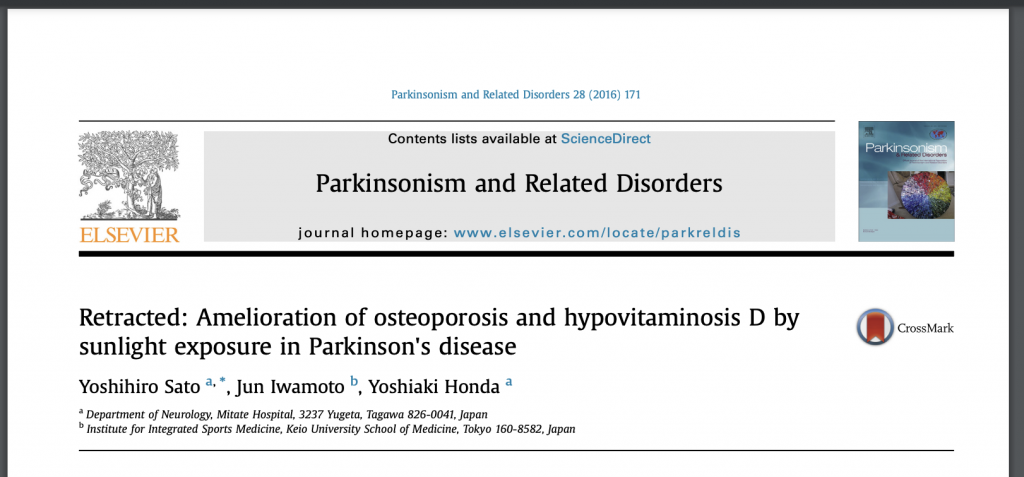
The author of a 2014 review article about the role of vitamin D in Parkinson’s disease has alerted readers to the fact that roughly one-sixth of her references have since been retracted. But she and the journal are not retracting the review itself.
The paper, “A review of vitamin D and Parkinson’s disease,” appeared in Elsevier’s Maturitas, which is the official journal of the European Menopause and Andropause Society. The author is Amie Hiller, a neurologist at Oregon Health & Science University in Portland, and the work has been cited 26 times, according to Clarivate Analytics’ Web of Science.
According to Hiller, she recently became aware that 10 of the 63 references in her article were to papers by Yoshihiro Sato, a bone researcher in Japan whose 103 retractions put him in the third position on the Retraction Watch leaderboard. Sato’s misdeeds run from lack of IRB approval to fabrication of data, in articles dating back to the mid-1990s.
Hiller’s letter on the subject, recently published in Maturitas but not linked from the original review, states that:
In light of the recent retraction of Yoshihiro Sato’s publications due to findings of fraudulent data, I and the editors of Maturitas felt it appropriate to reassess the review I authored (then under the name Peterson) published in 2014 entitled ‘A review of vitamin D and Parkinson’s disease’, in which Sato’s publications played a prominent role.[1] Not all Sato’s papers have been retracted at this time [nota bene: true, 103 is not all of them], but we feel it necessary to point out which assessments of the evidence contained in the review may have been affected had the publications from Sato not been included.
Out of 63 articles referenced in the paper, 10 were by Sato. The most affected areas of the review include section 3.2, Vitamin D levels are often low in persons with PD, where the review discussed the observation that vitamin D levels appear to be lower in persons with PD than in control populations. Most of the data for this claim were from three papers from Sato. These data were supported by two American studies and refuted by one Iranian study. If Sato’s work had not been included in the review, this observation would have been considered more tenuous. Section 3.3, Vitamin D is related to bone health in PD, also referenced primarily studies by Sato. Two-thirds of the references in this section (10 of 15) were to work by Sato. The other references here do support a relationship between vitamin D and bone health in PD but, again, without Sato’s work, there is much less evidence that this is the case. In section 3.6, Vitamin D appears to be related to the severity of PD symptoms, Sato’s work played a less prominent role. Of the eight referenced papers, two were Sato’s. With the inclusion of Sato’s work, seven of eight referenced publications show a relationship between vitamin D levels and PD symptoms; with its exclusion, five of six showed this relationship.
Overall, the removal of all Sato’s publications from this review calls into question our understanding that people with PD tend to have lower vitamin D levels and lower bone mineral density.
Hiller told us that the letter is “a notification/update” and that she has no plans to retract the paper, despite the unreliability of 16% of its references:
Both the editors and I felt it was reasonable to approach it this way. Rewriting the article with the time having passed would be a large endeavor in a field I have not kept up with.
Leon Flicker, the co-chief editor of the journal, told us:
In light of the Sato retractions we contacted the author of this review. This review is a narrative review and meta-analyses were not performed. We made the conservative assumption that none of Sato’s papers were reliable. Some of these papers have not been formally retracted. The author carefully reviewed her paper and decided which of the many conclusions in the review may have been materially affected by the withdrawal of the Sato papers. We believe that this letter, that has been linked to the original review, updates our readers sufficiently to the current situation.
Like Retraction Watch? You can make a one-time tax-deductible contribution or a monthly tax-deductible donation to support our work, follow us on Twitter, like us on Facebook, add us to your RSS reader, or subscribe to our daily digest. If you find a retraction that’s not in our database, you can let us know here. For comments or feedback, email us at [email protected].
From a career rewards perspective, it doesn’t seem fair to retract this paper. Its unreliability has nothing to do whatsoever with misconduct by the author. However, much of what it says is now unreliable so from an integrity of the literature perspective retraction may be warranted. This update is probably an attempt to balance the two. Sad that the author is in this bind.
Well, I am sympathetic to a point.
However, the decision to bury this information, as the article notes: “Hiller’s letter on the subject, recently published in Maturitas *but not linked from the original review*…” is a disservice to any future reader and demonstrates a lack of integrity on the part of the author and journal. Perhaps this will be remedied later.
Retraction is much more about the good of the field than the good of an individual. Unfortunately, sometimes innocent people suffer for the actions of others.
In this case, given that the Sato papers consisted of only 1/6 of those reviewed, and that they did provide findings from a ‘sensitivity analysis’ were you to remove those papers, then I think this was the right option.
I agree with you on the whole, but is a “career rewards perspective” the appropriate perspective to look at this situation? To not retract this review may benefit the author from such a perspective, but may mislead other researchers/ viewers…is this really appropriate?